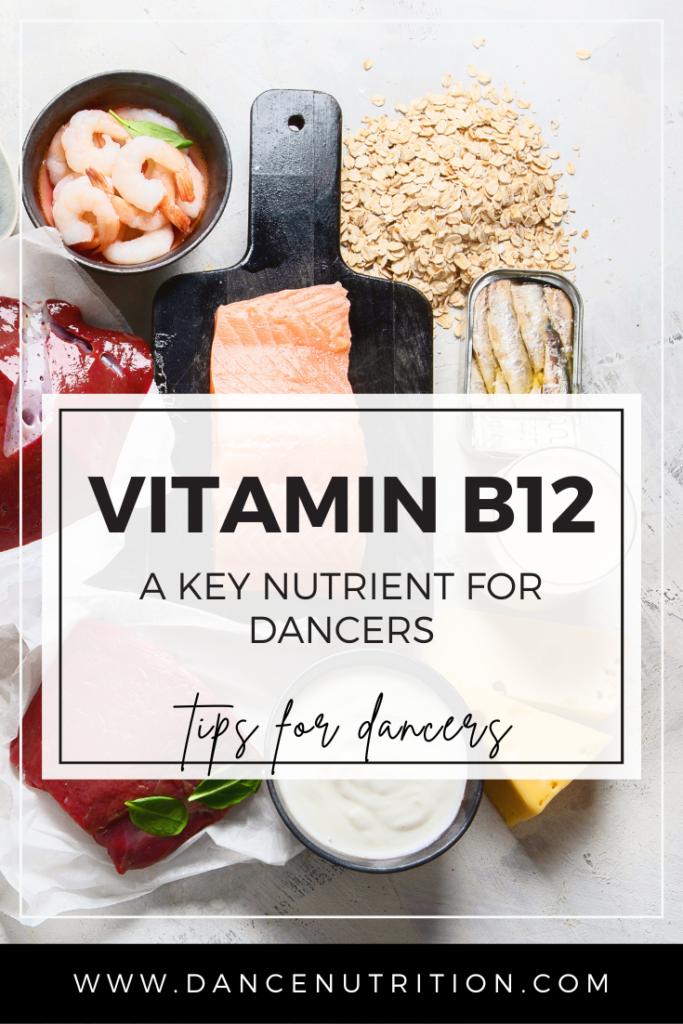Vitamin B12 plays an active role in many bodily functions— from your blood health and nerve functioning, to your growth and genetic makeup. Vitamin B12 also functions in the process of metabolism, supporting the breakdown of food and utilization of nutrients for energy.
Since our bodies cannot produce vitamin B12, we must obtain it through our diet. But with many dancers struggling to meet their nutritional needs, vitamin B12 can be overlooked. In this blog post, we’ll explore why this vitamin is crucial for dancers, how to ensure an adequate intake and provide some delicious recipes to incorporate into your meal plan even if you’re a plant-based dancer.
Why Does Vitamin B12 Matter for Dancers?
Vitamin B12, also known as cobalamin, is particularly important for dancers due to its involvement in energy metabolism, red blood cell production, and nerve function.
Energy Metabolism
Dancers require a tremendous amount of energy to sustain their rigorous training routines and performances. Vitamin B12 helps convert the food we eat into energy, providing dancers with the stamina they need to excel on stage and in the studio.
Red Blood Cell Production
Adequate levels of vitamin B12 are necessary for the synthesis of red blood cells, which transport oxygen to muscles throughout the body. Improved oxygen delivery enhances endurance and prevents fatigue during demanding dance sessions.
Nerve Function
Dancers rely on precise movements and coordination, which are facilitated by healthy nerve function. Vitamin B12 is essential for maintaining the integrity of the nervous system, aiding in the transmission of signals between the brain and muscles.
Am I B12 deficient?
Probably not, so avoid self-diagnosis and unnecessary stress. Signs of deficiency are quite general (fatigue, being most common) an experience that dancers face even without deficiency.
Under certain circumstances though, dancers can be at an increased risk. Certain diets, particularly those that limit B12-rich foods (animal products and packaged foods) are an example. “Clean” eating often omits both (animal proteins and packaged/”processed” foods) so a deficiency isn’t uncommon. In addition to this is the clinical presentation of certain stomach conditions, and subsequent prolonged use of antacids— limiting the body’s ability to adsorb enough B12 from food. Given the links between dancers and disordered eating, and the link between disordered eating and digestive issues, these questions aren’t something to ignore.
A food-first approach: vitamin B12 in food
Fortunately, it is possible to get an ample supply of vitamin B12 from your diet. Vitamin B12 is primarily found in animal products such as meat, poultry, fish, eggs, and dairy. But even plant-based dancers need not worry. Many packaged foods, such as breakfast cereals and plant-based milk alternatives are fortified with vitamin B12. A quick check on food labels can help to identify fortified options. Last is nutritional yeast. Nutritional yeast is packed with B12, in addition to folate and zinc. Its cheesy flavor makes it a versatile ingredient, perfect for enhancing the taste of savory dishes like omelets, rice, and pasta.
Do dancers benefit from B12 supplements?
It depends. First and foremost, you’ll want to consult with a medical doctor to assess your body’s current levels of B12. From there, a Registered Dietitian Nutritionist will help with appropriate meal planning to support a food-first approach in hopes of alleviating the financial burden of supplementation. Here’s a helpful ebook uniquely designed for plant-based dancers. If a B12 supplement is recommended, speak with your medical doctor and dietitian to help identify safe options and learn about its impact. For example, most B12 supplements will turn the color of urine into a brighter yellow since excess of the vitamin is excreted via the urine.
B12-rich recipes for dancers
By prioritizing a diet rich in vitamin B12, and evaluating the factors that can increase a dancer’s risk for B12 deficiency, you’ll be able to support your B12 needs. To get going, here are a handful of recipes that highlight B12-rich ingredients for your meal plan.
#1: Salmon Quinoa Salad
Start by marinating your salmon with a teriyaki glaze and bake in the air fryer for 10 minutes. In a separate bowl, construct a salad with an ample amount of cooked quinoa, mixed greens, cherry tomatoes, diced cucumbers, and additional veggies as preferred. Top with crumbled cheese and a generous coating of lemon vinaigrette. Serve salmon atop your salad and enjoy!
#2: Veggie Omelet
Start by sautéing vegetables such as spinach, bell peppers, onions, and mushrooms in butter or oil. Whisk together eggs, add to veggies, and cook to your liking. When done, sprinkle a generous dose of nutritional yeast and serve alongside toasted sourdough.
#3: Greek Yogurt Parfait
Layer yogurt with fresh berries, fortified whole-grain breakfast cereal, and a drizzle of honey for a B12-rich snack that provides a perfect balance of protein, carbohydrates, and antioxidants.



